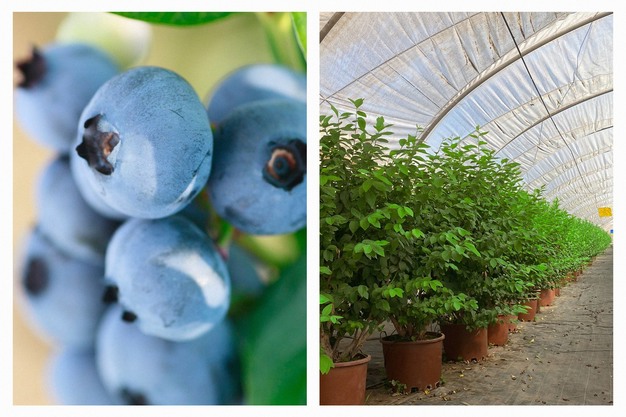Morocco's blueberry acreage continued to expand last season with new projects and new genetics. The Moroccan blueberry industry has not given up on its goal of reaching 100,000 tons of production and offering a year-round supply. This shows not only its consolidation, but also its desire to become a major player in the international blueberry market.
Fresh, quality berries
"Of all the berries produced in Morocco, strawberries have the largest planted area, although raspberries have the longest season, lasting from September to July. In the case of strawberries, the season lasts from November to June, and in the case of blackberries, it starts in November and ends in April. The blueberry season currently starts in October and lasts until June, although with the new genetics this period is going to be extended."
"The vast majority of berries are exported as fresh fruit and shipped to more than 60 different destinations around the world, mainly in Europe, but a big part goes also to Asia. Morocco's geostrategic location not only allows easy access to important markets, such as Europe, but it also gives it the right soil and weather conditions to be able to produce all year round."
 Blueberry production in Morocco / photo: Blueberries Consulting.
Blueberry production in Morocco / photo: Blueberries Consulting.
Strategic advantages
"It is the most stable and secure country for foreign investment in North Africa and the Middle East, and its human resources are highly experienced in every aspect of the industry, from engineering to the careful labor required for the fruit's harvesting and processing."
"Morocco has good infrastructure and logistics, which guarantees the sustainability of any production project. The authorities provide plenty of support and there is public-private collaboration in the main activities linked to the development of the industry. It has good accessibility to water resources and the price per cubic meter of water is reasonable, in addition to enjoying the aforementioned advantage of its fields being just three or four days away from the final consumers in Europe."
"What gives Morocco an advantage over the competition? We can highlight its good agronomic practices and the adoption of the latest generation varieties, as well as the availability of labor and its proximity to its destination markets."
28th International Berry Seminar Morocco 2023 / photo: Blueberries Consulting.
New challenges
"However, like the vast majority of growers in the world, Moroccans have had to face major challenges due to climate change, mainly with regard to high temperatures, which can have a detrimental impact on the production in multiple ways, affecting not only the photosynthesis, but also the relative humidity and affecting the good pollination of the crops."
These topics and some other key agronomic aspects, such as genetic development, European market conditions, the impact of technology on berry processes, substrate characterization, nutrition and biostimulation strategies, intelligent irrigation monitoring, or the use of biocompounds for stress management, among others, will be addressed at the 33rd International Berry Seminar, to be held on 11 September in the halls of the Royal Tulip City Center Hotel in Tangiers.

28th International Berry Seminar Morocco 2023 / photo: Blueberries Consulting.
A profitable industry
Morocco is one of the world's most attractive areas for development, given the magnitude of its production, the quality of its fruit and its permanent growth and varietal sophistication.
On the commercial side, Moroccan fruit is sold to various destinations besides Europe, such as the Middle East, Russia, Asia and even Canada, achieving average prices above those of its competitors. Only niche domestic industries, such as Australia and New Zealand, are able to get better export prices for their predominantly airfreight-based programs.
Would you like to participate in the annual meeting of Mediterranean Berry Growers?
Places are still available!
For more information:
Blueberries Consulting
Tel.: +56 9 3469 3871 (WhatsApp)
contacto@blueberriesconsulting.com
www.blueberriesconsulting.com
